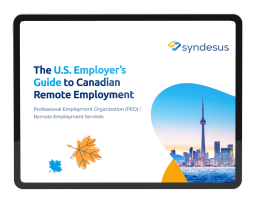This article delves into the potential implications of this proposed tightening and explores an alternative option for tech professionals seeking employment opportunities in North America – specifically Canada’s Global Talent Stream (GTS) program and why it may be a powerful backup plan.
H-1B eligibility criteria tightening and the potential impact
The proposed tightening of H-1B eligibility criteria centers on the definition of a “specialty occupation.” The new rule seeks to narrow the scope of specialty occupations, potentially excluding certain tech roles traditionally considered eligible for H-1B visas.
Immigration lawyer Cyrus Mehta, aptly describes the potential impact of this narrowing: “The proposed rule would likely result in a significant reduction in the number of H-1B visas available for tech workers, as it would exclude many positions that are currently considered specialty occupations.” While there are some positive aspects — for example, codifying the deference that USCIS gives to prior approvals and allows companies to file H-1B petitions on behalf of owners under certain conditions in order to encourage entrepreneurship — this tightening of H-1B visa eligibility could have several detrimental consequences.
Limiting access to skilled tech talent
American companies, particularly those in the tech industry, rely heavily on H-1B visas to secure the talent they need to thrive. A tightening of H-1B visa eligibility may make it more difficult to bring in needed tech talent, and can, as a result, stifle innovation and economic growth.
Negative impact on US global competitiveness
The US already faces a significant shortage of skilled tech workers. Further restricting H-1B visas would exacerbate this shortage, making it even more challenging for companies to find qualified candidates. This, in turn, can have a longer-term impact on the US economy on the global competitiveness stage.
Discouraging tech talent from pursuing careers in the US
The proposed tightening could have the downstream effect of discouraging talented tech professionals from pursuing careers in the US, opting instead for countries with more accessible immigration pathways.
Canada’s GTS program is a viable alternative
Amidst the uncertainty surrounding the H-1B program, Canada’s GTS program emerges as an attractive alternative for tech professionals seeking employment opportunities in North America.
The GTS program is designed to expedite the processing of work permit applications for highly skilled foreign workers in key industries, including technology. The program offers several advantages for tech professionals, including a streamlined application process allowing eligible candidates to obtain work permits within two weeks with the flexibility to work for US companies remotely.
This allows the employees the flexibility to either find an employer in Canada or maintain their existing relationship with a US company while residing in Canada. The GTS allows foreign employees to enjoy the best of both worlds: a vibrant career with US wages and the stability and quality of life that Canada consistently delivers. Canada’s overall booming tech sector and quality of life is a major draw for skilled workers worldwide. There’s also the cost savings, primarily due to the lower cost of healthcare and education and potentially more favorable taxation, depending on your situation.
Employees will also be eligible for permanent residency and Canadian citizenship within a few years, meaning they will have more immigration options and all the benefits of being a Canadian.
A PEO allows employers to hire and retain skilled workers in Canada
Working with a PEO can give employers options, which is becoming increasingly useful as the H-1B program becomes more challenging. A PEO acts as a co-employer, handling human resources, payroll, and other administrative tasks, meaning employees can continue working for a US employer even while based in Canada. The PEO will essentially take over certain responsibilities, typically handling tax, insurance, benefits, and compliance.
The employee and US employer can maintain their working relationship, meaning only the administrative aspects are routed through the PEO. The US company gets to hire and retain key talent, avoid the H-1B visa process altogether, and have easy access to that employee when needed.
Syndesus can help US-based companies hire and retain top talent in Canada
The proposed tightening of H-1B eligibility criteria raises concerns about the future of tech talent acquisition in the US. While the proposed changes may have some positive implications, they also pose significant challenges for US tech professionals seeking employment opportunities. Canada’s GTS program emerges as a compelling alternative, offering a streamlined and accessible pathway to obtain work permits and avoid the H-1B headache altogether.
As a Canadian employer of record, Syndesus can hire tech workers remotely on behalf of US employers, which means that the immigration, payroll, HR, tax, and other administrative processes are taken care of.
Reach out to us to learn more about how our PEO services can help you hire and retain staff remotely. n October 20, 2023, the Biden administration proposed significant changes to the H-1B visa program, the primary pathway for highly skilled foreign workers to obtain employment authorization in the United States. While these proposed changes encompass a broad range of modifications, one particular aspect is not being written about but may be quite consequential – the potential tightening of eligibility criteria for H-1B visa applicants.

About Marc Pavlopoulos
Marc Pavlopoulos is the CEO and Founder of Syndesus, a Professional Employer Organization that provides PEO services for US companies seeking to employ workers remotely in Canada, builds engineering teams in Canada for VC-backed startups in the US, and set-up remote offices in Canada for US companies. Additionally, Syndesus can assist foreign-born tech workers (and their US employers) with options for working remotely in Canada if they cannot stay in the US due to immigration/work visa issues.
As an American who has moved to Canada twice (for grad school and for work), Marc understands the challenges involved in starting a new life in a new country. Marc is a son of an immigrant and has great respect for people who leave their home country and seek a better life in the US or Canada.
Marc’s goal is to do everything he can to help those individuals achieve their dreams. Marc also has a second venture (Path to Canada) which helps foreign-born technical workers who cannot stay in the US (for immigration reasons) get a job and work authorization to work in Canada.




